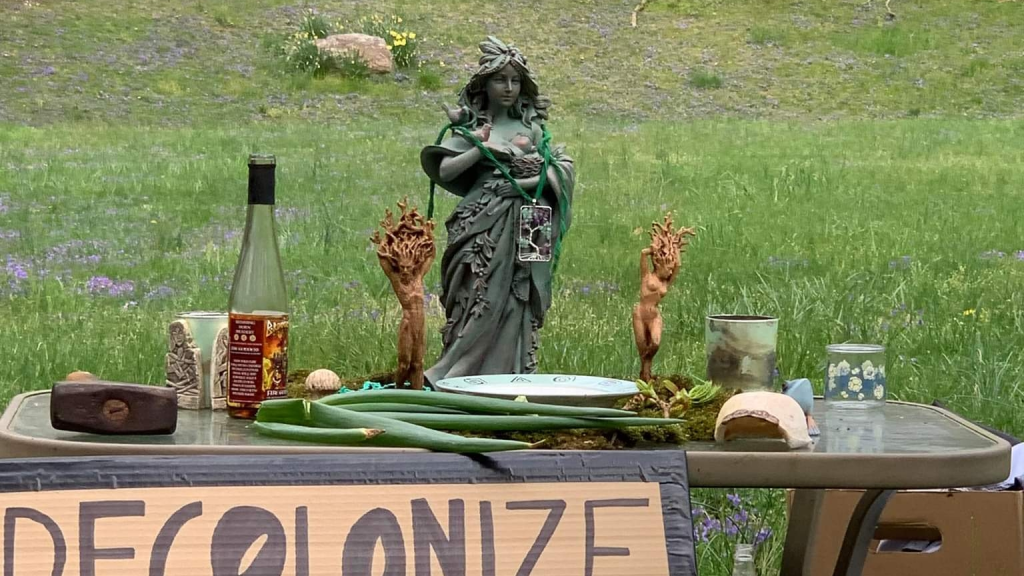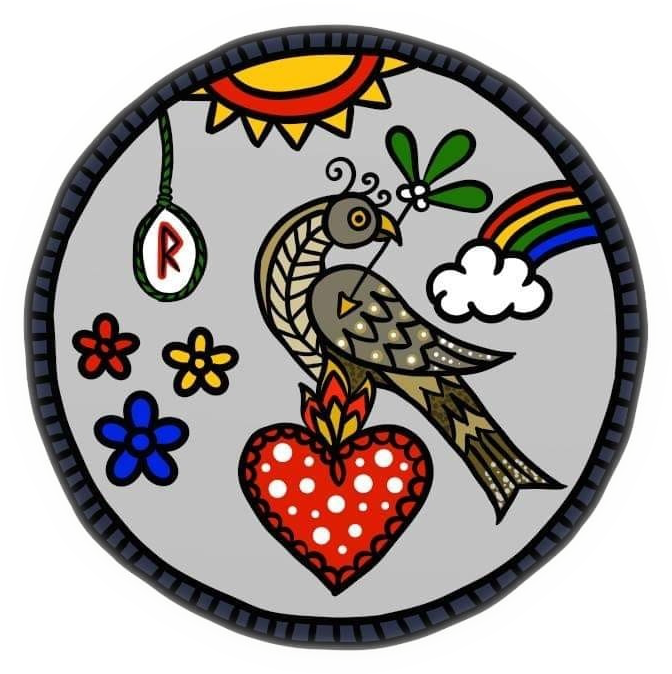For three years now, I’ve been hosting a ritual to Jörð on the Saturday before Earth Day.

At first, the motivation behind these rituals was a bit selfish. Finally realizing the severity of the climate crisis was crushing, which should be unsurprising given that it is literally the biggest threat ever posed to living things on this planet. I vividly remember laying face-down in the dry clay, alternately crying when lucid, and dissociating when not. Even a few minutes earlier I would have still found the phrase “dirt-worshipping Heathen” obnoxious, but I couldn’t exactly act like this wasn’t a fair accusation now.
The thing is, this existential fear isn’t new. It was only new to me. And the reason it was new to me was because whiteness and my family’s class status had insulated me from having to actually confront it. I can buy my life off the shelf if I so choose, enabled by colonial government and exploitative industry. This crisis has been ongoing for literally everyone else, for hundreds of years.
This sense of interconnection that the looming threat of climate change brought me should have been intuitive. But the world built on my behalf requires being separated from the earth. The comparatively new sense of a sprawling, tangled web of fate under my feet filled me with cold-muscled fear.
Like most people who crack under the strain of pretending to cooperate with absolute bullshit and feeling like everyone else knows something you don’t, I brought it to therapy. My therapist tried his damndest to instill some hope in me for life on earth—namely Lif and Lifthrasir as a metaphor for plastic-eating, thermophilic microbes, should they evolve in our absence. But none of this took away from the core fear that the world is ending for real.
In part because I already associated the events in ragnarök with the carbon cycle, I decided that the way to cope with my eco-anxiety would be through designing rituals again. This time, something heavily inspired by Völuspá.
Initially, what I had in mind had zero resemblance to the way I do Jarðarblót now. I had originally contemplated something theatrical, angry, and involving fake blood and scorn poles. I still have the unfinished papier-mâché horse head on a shelf in my closet. But eventually, something clicked.
We’re not doomed yet. But even if we are, is it better to meet the end terrified and angry (and presumably covered in fake blood and yelling on a street corner in grossly mispronounced Old Norse), or is it better to be reassured that we did our best, and meet the end in a state of liberation and dignity?
A lot of things simply do not matter. The economy, the stock market, the law, the idea of governmental legitimacy, the arbitrary way labor is divided, manufactured scarcity, shiny things and gasoline being worth a currency that becomes so precious that it’s useless when it outweighs human life. Nobody likes it but everyone is inexplicably chomping at the bit to justify it, even though it’s killing us all, starting with the people who have been deemed acceptable sacrifices.
Which is bullshit.
And seeing as it’s all made-up bullshit, can’t we come up with better bullshit? Why should I comply with a supposedly objective reality, which is just cover for worshiping some manufactured god defined by cruelty and rapacious greed, who offers nothing in return? Especially when his worship comes at the expense of Jörð, who gives us everything, and is in agony.
She does not deserve this.
Step one was making a point to give her the adoration that she is due. Earth day was an easy choice, but it seemed insultingly lazy to make a ritual for that and call it a day. I felt like there was too much going on underneath to just put a Heathenized window dressing over an event. And I hate that kind of thing, anyway.
Valablót. UGH.
But our purported values as Heathens were compatible with a lot of what I had learned in my frantic search to somehow solve global warming. I also figured, given how prone I am to crying during ritual, that this would be a great way to try and offer a place for catharsis, education and community-building. If ritual is a social space—and it very often is—then it also has great potential as an organizing space, or as a venue for interpersonal support.
On April 18th of 2020, after having to update my covid safety plan (because now that was happening) three goddamn times, I held my first attempt at Jarðarblót. I had to switch from Skype to Jitsi at the very last minute. Tech was my enemy. I forgot a damn corkscrew. I had no idea what I was doing.
But I did it.
And even with all these fuckups, the potential was still obvious. The value was still recognized and it was agreed that everyone who took the time to make it happen was on to something. I had been planning to do it as a repeat thing anyway, but miraculously not being dismissed as an incompetent little idealist strengthened my resolve to do it again.
Year two was just 3 people in a Jitsi chat, but it was an enlightening and very fun five hours of drinking and discussing just how far the scope was if we spent the time to talk about it.
I wanted to keep exploring this potential further for year three.
This year, that Saturday before Earth Day was also the first full day of Sigrblot, so I decided to do a twofer. As a general rule, when I do the same ritual more than once, one of my goals is to expand and refine the scope, and this in particular was too good of an opportunity to pass up. With themes like victory and the growing season, there was a whole new lens I could examine the possibilities of a Heathen liberation theology through.
And honestly, I was feeling broody for a new ritual.
Of course, I keep forgetting that it’s harder to write a new ritual than update an old one. I’ve been doing this in general for a little over four years, so—rare for me—I actually feel like I know what I’m doing. But the transitional stage of having to actually verbalize these visceral senses of how the gods and stories support your particular cause, and take the care to properly state your case…is shockingly tedious. And this was before I was doing the physical work of setup for two days in a row.
It seems like rituals with Distelfink get started so much faster, but then again, there’s always several people doing setup at the same time. And I hate asking for help. But of course the three people I invited to attend in person for the first time were Rob, who is basically my cool dad; Kevin, who has been a supporter from the beginning; and his partner Lea who was comparatively new to me but wonderfully enthused from the get-go. I was going to receive help whether I wanted it or not. Thankfully, by this point, I was open to it.
…but a little bit stubborn about it, because I still refused to ask and waited until people offered.
Coinciding with the home stretch of getting the ritual program ready and frantically writing to-do lists and sorting things into banker’s boxes, I made a joke about nesting to my therapist that ended up turning into me revealing how bummed out I was that I don’t have kids.
I had kind of resigned myself to the idea that it would never happen. No partner, no house, no steady income, which were all the things I had on my waiting-to-try list. And with the looming threat of ecological collapse, it seemed unkind at best to knowingly subject a brand new human being to it. I figured I would just have to suck it up and deal with feeling agonizingly empty every few months.
But in the session just before the day of the actual ritual, I eventually realized that this whole time I had been feeling like this, I had also been trying to make my case that even the literal end of the world doesn’t have to mean surrender. The entire point was that, as a social species, as part of a web of living things, community is what defines us. And while I grew up feeling lonely and put-upon for being alive, any children I would have would be born into a solid community and have a sense of spiritual, interpersonal home available to them. The fact that I had been so obsessed with trying to make the best possible decision for someone who doesn’t even exist was proof enough that my primary motivation was not selfishness clouding my judgement. This wouldn’t be doing something to someone, this would be giving them something.
Life is worthwhile, or can be made worthwhile.
And there is nothing like sitting in the grass, in the shade, just warm enough in the spring and picnicking with your friends, to drive that point home. It is one thing to be rightfully proud of yourself for a line like, “gifts for gifts, wealthy in one another’s company.” It is something else entirely to experience those broken loaves and tipped cups, or to taste the streaks of fungus in a piece of cambazola and contemplate the rot that returns the trees back into Jörð’s embrace. Someday that will be you. And you will be able to rest your head knowing that you have been impactful, and what you did with your life mattered.
In moments like that, I’m not struck by anxiety when I can almost see the tangled web of living things. Instead, I feel cradled, supported, and as if this sense of security and safety can be transmitted through the mycelium beneath us.
Let us remember our tangled roots and help each other grow.

Thank you for sharing all of this. Your perspective really resonates in me.
LikeLike